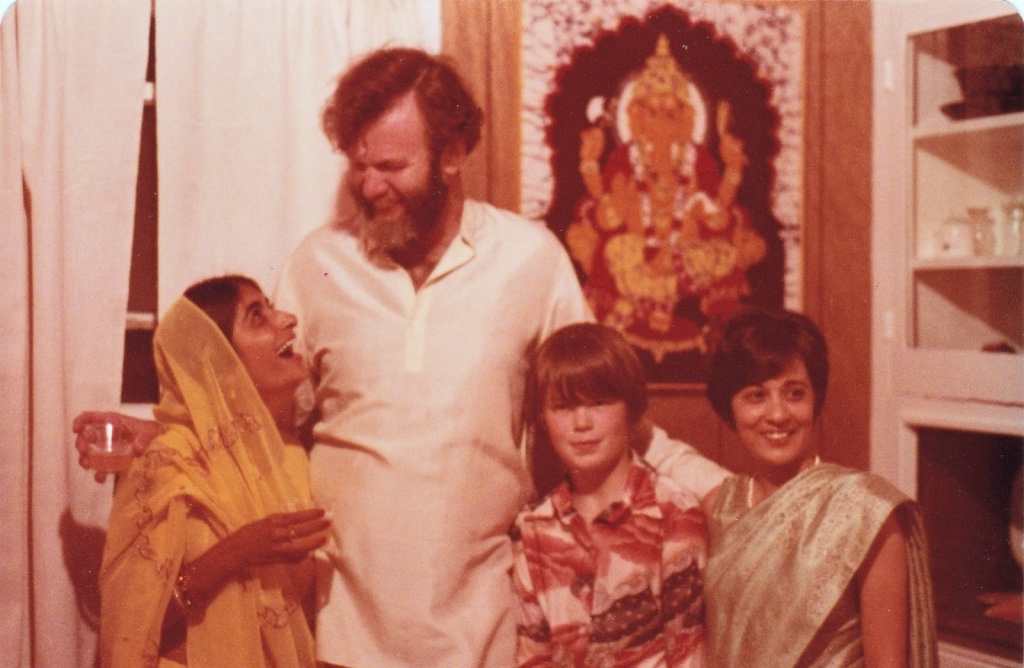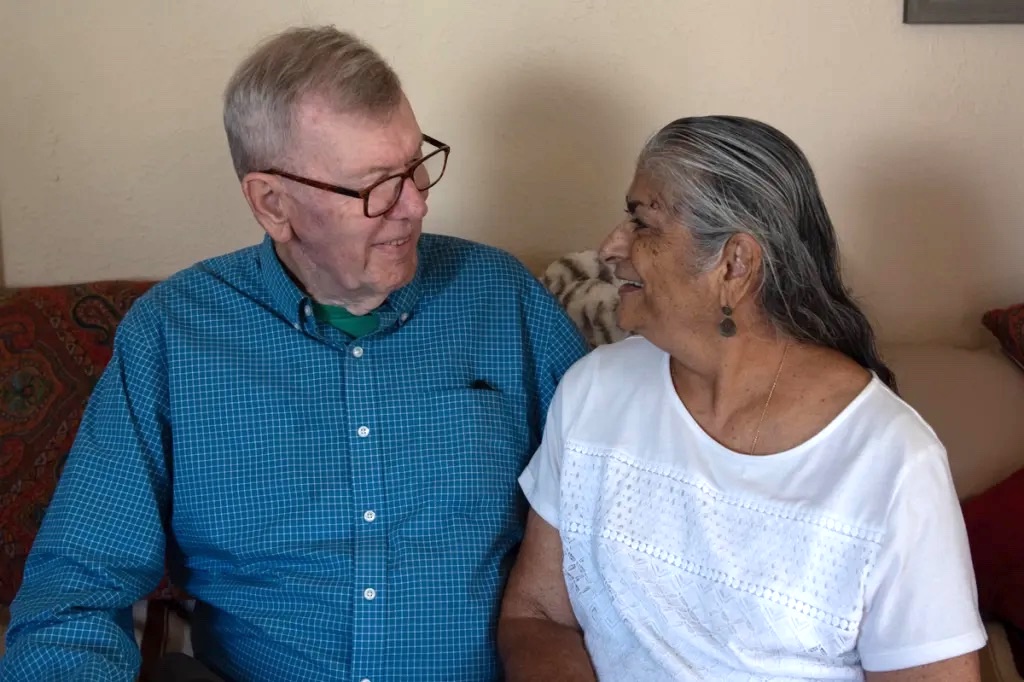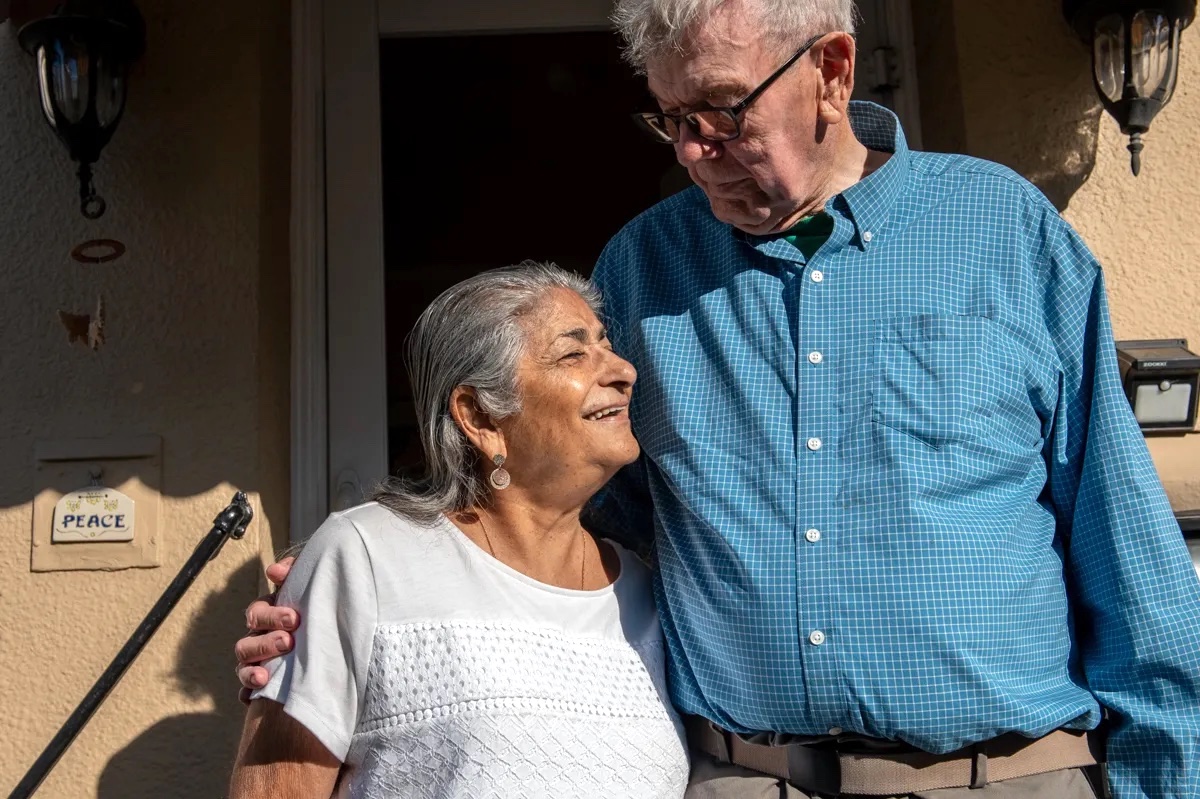By Nina Mohan | India Currents
The first time Roshni Rustomji met Chuck Kerns, it was in 1976. Roshni was a professor at Sonoma State and Chuck a student who just wouldn’t graduate.
Peter Scarlet, a mutual friend, had asked Roshni if she would help Chuck who seemed to be struggling. Roshni asked Chuck how many units he had taken and realized that he should have graduated five years ago. “Well, when you first came for advice, I nearly threw you out of my office,” Roshni joked.
Chuck had gone back to school on the GI bill as an English major. Along the way, he discovered his love for films. “And the only way to get film equipment easily was to be a student. So, if you graduated, then you lost access to everything, while as a student you got free equipment,” Chuck explained.
“My thing was, of course, to have students graduate, and his was not to graduate,” Roshni said. “And I told Peter, ‘If you ever again send me a student like this, I will never talk to you again.’”
They met again when Chuck rented a room at Roshni’s place. Proximity built closeness and the two of them developed a nightly routine of dessert and a walk. Initially it was their mutual love of literature that drew them together. They became such good friends that Roshni drove Chuck, who didn’t have a car, to his dates.
One day, when Chuck was stood up, Roshni picked him up from the bus stop and suggested they see a movie. Afterwards, they had dessert at a little restaurant next to the theatre. That was their first date.

She is the Person I Married
Chuck and Roshni have been married for 44 years. Chuck was born and raised in the United States and grew up in a still-segregated America. Roshni was born at the end of British rule and was a child during the Partition of India and Pakistan. Chuck is white and Roshni of South Asian ethnicity.
They don’t consider their relationship extraordinary. Nor do they feel the differences – race, religion, culture – that society relies on to divide people.
“The real difference is that I’m short and he’s tall,” Roshni said. “The other is technology,” interjected Chuck, who later spent his career in computer programming. “It’s one of the times that my world is not congruent with Roshni’s world.”
Chuck is surprised when people see Roshni as an outsider. When he sees her with her Parsi community, with family and at functions, he notices that she navigates the two worlds differently, but that doesn’t redefine her in his eyes. “I don’t really know you as a person from another race, I know you as a person from our marriage,” he told Roshni.
The couple were lucky to have family accept and support them. Chuck and Roshni’s mother bonded over Scrabble, and her father took Chuck on a walking tour of Karachi when they first visited. Chuck and Roshni visited Roshni’s sister in Mumbai, where the first thing Chuck heard was David Bowie on the radio in Bandra.
Chuck’s family was equally adoring of Roshni. She met his two sisters in 1980. “Everybody loved Roshni,” Chuck said.
Seeing the World in Many Ways
Roshni and Chuck credit their ease with diversity to early experiences with different types of people. Roshni’s father was involved with different embassies in Pakistan and at a young age she was introduced to American music and culture and met people from around the world.
The year after she graduated high school in Karachi, Roshni came to study in Racine, Wisconsin, as part of the American Field Service (AFS) program.
AFS was an incredible experience, Roshni said. “It was called AFS because a group of ambulance drivers from the second world war got together and said they didn’t want more war. How to stop it? You stop it only when you get young people together and they find out we’re all human beings, they fall in love, they do this, they do that, they get drunk together,” Roshni laughed.

Chuck traveled with the U.S. Army: he was drafted during the Vietnam war and sent first to the Monterey Language Academy to learn Polish, and then to Germany, where he spent three years. Though he’s acutely aware that his time in Monterey and Germany was against the backdrop of war that killed thousands, he found that travel gave him the opportunity “to see the world in ways I might otherwise not have.
“Meeting other people is one of the real joys of life,” Chuck adds. For all their light-heartedness and optimism, they haven’t escaped racism and Roshni admits her joke about their height is a way to cope.
Seeing and Experiencing Racism
Roshni was nine when India and Pakistan were divided. As the region was split apart, she saw neighbors supporting one another, one instant, and killing each other, the next. She was attacked for belonging to the wrong religion.
After college, when Roshni enrolled in graduate school at Duke University, the south was still segregated and her roommate, upon realizing Roshni was Indian, demanded a white roommate, choosing to drop out when neither the school nor the other students accommodated her.
Roshni recalls experiencing blowback for being married to a white man. A little girl – half Parsi herself – commented on how awful that a “tall, white man” had married “short, dark” Roshni. Another woman asked her how much she’d paid Chuck to marry her. The comments were “hurtful and cruel,” said Roshni.
Chuck comes from a working-class family in Baltimore and went to a high school that was not integrated. In the 11th grade, he recalls being asked at the AFS interview, “How would you feel if you went to a family that wasn’t white?” “I’d never even thought about that before,” he said.
In the 1970s, in Rohnert Park, where the two lived while Roshni was teaching at Sonoma State, they were denied housing because the apartment complex wouldn’t rent to a mixed-race couple. And Chuck recalls that back then, when Sonoma was very white and rural, Roshni was sometimes denied service in stores.
Are Racism and Discrimination Defense Mechanisms?
Racism and religious discrimination are “always presented as a defense,” Roshni said, questioning the belief that people of other cultures are out to deplete resources. At some basic level, she can understand that it may be because of economic inequalities. But when it comes to religious discrimination, “I just don’t understand it,” she said.
“When I was growing up, white people did not include Italians or Greeks. Whiteness has changed and tends to incorporate different groups that have bought into the middleclass American life,” Chuck remarked.
Roshni notes that even when U.S. schools have diverse student bodies, it’s not always enough because when the kids go home, it’s often to homes where the parents are friends only with people from their same racial or cultural group.
“There’s this world view that we need to all stay in our own lane and that cultures and traditions will crumble,” Roshni remarked, agreeing that inter-racial marriages illustrate how there is so much joy, contentment, and power. Instead of losing one’s culture, “you just gain more that you might never have had — experiences, knowledge, traditions.”
“Chuck is Chuck. I tease him about being a gringo and getting in the sun and turning pink, but I think my life is so much more enriched knowing the culture not through books, but through someone who is my best friend, who is the person I love the most,” said Roshni.
This article is part of the Love Across Colorlines series, a collaboration of 20+ ethnic media outlets looking at interracial marriage in California at a time of rising hate. Visit Love Across Colorlines to see more in the series.




